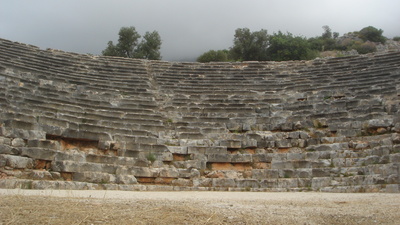CLERGY
WHO HAVE LOST THEIR FAITH
While I can feel sympathy for clergy who have lost
their faith, I do have a few questions for them, more for their
professors in seminary, a handful for Daniel Dennett, and a couple of
very basic ones for Solange de Santis. It was the
journalist, de Santis, who has just now covered the publication of
“Preachers Who Are Not Believers” in the journal Evolutionary
Psychology, co-authored by Dennett. Five
clergy are studied, and a high percentage of them silently carry an
awful secret that would destroy their careers or families.
Privately they nurse a shocking disbelief that causes them
immense agony and loneliness. To one, God is a
poetic human invention. For another, seminary
“blew apart” his faith, when he realized there were diverse viewpoints
about God. One discovered that what he learned
about the historical origins of the Bible doesn’t fit what was taught in
Sunday School. Another read a little, and
stumbled upon the fact that there are variations in the ancient copies
of the Bible, and he wonders if they picked the right one.
I know the loneliness and pain of the clergy, and
hard questions that riddle the life of the soul. But
I am totally puzzled by this report of de Santis, and these five
clergy. Who trained these clergy in seminary? and
have they done any reading since seminary? The
questions they raise are old, and wisely reflected upon, and profoundly
handled by our best (and even our middling) theologians.
The Church has always known, for 2000 years, that there has
always been diversity within Christianity – which is its beauty: God’s work isn’t a straitjacket, but God is flexible,
and doesn’t mind being apprehended a bit differently by me and my
neighbor, much less a Terra del Fuegian or a Russian Orthodox priest.
Sunday School has never done a brilliant job of
probing historical origins; but Christianity has always known its
historical origins, and its mixed heritage of beauty and embarrassment. We have always known there are variations in the
earliest manuscripts we possess. But this is true
of everything in history: we have divergent
versions of the Gettysburg address, and Shakespeare’s plays; encounters
between Julius Caesar and Cleopatra are notoriously difficult to specify
with historical accuracy – but they certainly were tight.
I have personally looked over hundreds of textual differences
among early manuscripts, and can’t find a single one that raises the
slightest question about the heart of what we believe Jesus said or did.
Bart Ehrman, who has sold more books in this zone
than anybody else, acts as if historical questions and textual
uncertainties have just been discovered, or that the Church has locked
these truths away in secret vaults in order to prop up a bogus
institution. But every great theologian in every
century has known about, grappled with, and understood what these five
clergy somehow missed in their education and reading. I
feel for their ache, but I could have recommended a couple of books
that could have resolved their intellectual dilemmas.
I’m a bit startled by the superficiality of de
Santis’s review of Dennett. De Santis works for The Religion News Service, and their web site claims they
are “devoted to unbiased coverage” of things religious. Were
I reporter on any other subject, I would ask a question like “Who is
this Daniel Dennett who has conducted this research?” or “Is five a
decent sampling of clergy?” Five is admittedly a
small number of people to interview, but you see immediately that the
low number implies masses: we asked five, and
Whoa! look what we found! What if we’d
interviewed hundreds?
Dennett is indeed a social scientist, but if you
simply Google him, you will discover he’s a social scientist with a
pointed, hostile agenda when it comes to faith. He
has written often, blasting faith, and hardly in the “just the facts,
ma’am” vein. I never buy conspiracy theories. But Dennett is one of quite a few authors who have
jumped on a runaway bandwagon, and now they feed off one another’s
popularity. I stumbled upon de Santis’s article
in my local paper’s “Faith” page; clearly the “faith” story we gobble up
nowadays is the loss of faith. In a country
where candidates for office pander to the religious sensitivities of
voters, the bestselling books in America are Sam Harris’s The
End of Faith, Dennett’s own Breaking
the Spell, Christopher
Hitchens’s God is not Great, and above all else, Dan
Brown’s The DaVinci Code, in which the eminently learned
Leigh Teabing unveils long hidden truths about the manufacture of the
Bible, political maneuvering on the divinity of Christ, and a hush
campaign about the sexuality of Jesus. The
problem is The DaVinci Code is fiction, and much of what
Teabing claims in the novel and movie is simply, historically, and
verifiably (even to atheist historians) false. And
what is true in what these authors write is, as we have noted, old,
utterly familiar to undergraduate religion students, regurgitated
knowledge but cast in a sensationalist spin.
To me, de Santis might
have done a bit of interviewing to understand Dennett’s sampling of
five – not to find five others who would declare “I really do
believe!” or “Profound theology is identical with Sunday School!” or
“Doubting is evil,” but to inquire into Dennett’s agenda, and methods. Did the five clergy at some point miss something, and
so instead of the implied deduction, that if even our clergy are hiding
disbelief, why would those who rely upon them as guides believe? so how
could there be a God? De Santis might have
noticed the way texts and history and science are regarded as great
friends of the vast majority of us in Christianity, not perilous foes to
be feared and silenced.
Dennett, Harris, Hitchens and Ehrman are wrestling
with a straw man, a simplistic, twisted version of Christianity only
fools would believe. David Bentley Hart (whose Atheist Delusions humorously dismantles the absurdities of
Dennett, Harris, Hitchens and Ehrman) wishes
Christianity’s detractors “had the good manners to despise Christianity
for what it actually is” instead of a silly, trivialized, watered down
version no one has ever espoused – and so do I. We
do not mind hard questions, or sharp critique, or even disbelief – but
at least make your assault on whom we really are, and refuse to believe
in the Christianity that has withstood the test of centuries, for we
want to know more, to have any and all illusions dispelled.
Being disillusioned about God or what we may have been mistaught
in Sunday School is always a good thing, for to be dis-illusioned is to
shed illusions. Most critics of Christianity
point to the problem of suffering, and conclude “If God is good, how can
there be suffering?” But we have always known
about suffering, and the Church has not only caused our share of it, but
we have also shared with those who suffer: we
see them up close, in hospitals and in shelters we operate, on the
mission field and in orphanages, and we would not have anyone labor
under the illusion that God fashions some sort of protective bubble
around us, or is a rapidly functioning magical salve when something
hurts. Our story is about a God who actually
suffered, and suffers, and we miss the true God then if we never figure
out how to pair up God and suffering, for they are very close, and that
is our comfort and redemption.
Or the critics
point to the great harm Christianity has done in history.
Indeed, we are ready to confess every sin; but have atheists
ushered in peace? Hitler loathed Christianity,
and Stalin wasn’t exactly a pious man. Are the
mockers of a made up Christianity getting organized around this world to
alleviate human suffering?
I just
returned from a mission trip to Brazil, where I spent time with someone
Dennett didn’t interview, and would never understand. Marion
Way grew up in South Carolina, and his childhood heroes were Methodist
missionaries. He learned Portuguese and offered
to try to help hurting people in Angola. A civil
war erupted, and he was thrown in jail and beaten within an inch of his
life. When they finally let him go, instead of
scurrying to safety back in the United States, he asked “Where else do
they speak Portuguese?” So he and his wife Anita
went to Rio de Janeiro, to live in the poorest favella in the city – in
1962. They are still there, 48 years later,
humble, working, feeding children, providing medical care and job
training, and all because they believe in God. But
they would not even say much about their faith. This
is the real issue: the five Dennett listened to
spoke of “my faith.” Have I lost my faith? Does
my faith work? Marion Way would be a bit
mystified by this thought. He is a person of deep
faith, but for him the real reality is God. It
is God who saves, God who is always there, God who motivates and loves,
God who survives faith or unfaith or doubt or piety or viciousness or
any other turn in the history of the world.
Marion Way
would know what to do with these five clergy, and even with Dennett,
Harris, Ehrman, Brown, and de Santis: he would do
what he does with the Brazillian children. He
would smile, and hug them, and offer them a bite to eat, and say a
prayer for them.


